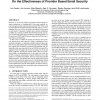Free Online Productivity Tools
i2Speak
i2Symbol
i2OCR
iTex2Img
iWeb2Print
iWeb2Shot
i2Type
iPdf2Split
iPdf2Merge
i2Bopomofo
i2Arabic
i2Style
i2Image
i2PDF
iLatex2Rtf
Sci2ools
CCS
2015
ACM
2015
ACM
Security by Any Other Name: On the Effectiveness of Provider Based Email Security
Email as we use it today makes no guarantees about message integrity, authenticity, or confidentiality. Users must explicitly encrypt and sign message contents using tools like PGP if they wish to protect themselves against message tampering, forgery, or eavesdropping. However, few do, leaving the vast majority of users open to such attacks. Fortunately, transport-layer security mechanisms (available as extensions to SMTP, IMAP, POP3) provide some degree of protection against network-based eavesdropping attacks. At the same time, DKIM and SPF protect against network-based message forgery and tampering. In this work we evaluate the security provided by these protocols, both in theory and in practice. Using a combination of measurement techniques, we determine whether major providers supports TLS at each point in their email message path, and whether they support SPF and DKIM on incoming and outgoing mail. We found that while more than half of the top 20,000 receiving MTAs supported TL...
Related Content
| Added | 17 Apr 2016 |
| Updated | 17 Apr 2016 |
| Type | Journal |
| Year | 2015 |
| Where | CCS |
| Authors | Ian D. Foster, Jon Larson, Max Masich, Alex C. Snoeren, Stefan Savage, Kirill Levchenko |
Comments (0)

